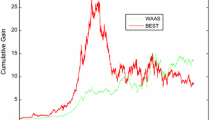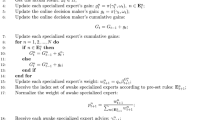Abstract
This paper concerns online portfolio selection problem. In this problem, no statistical assumptions are made about the future asset prices. Although existing universal portfolio strategies have been shown to achieve good performance, it is not easy, almost impossible, to determine upfront which strategy will achieve the maximum final cumulative wealth for online portfolio selection tasks. This paper proposes a novel online portfolio strategy by aggregating expert advice using the weak aggregating algorithm. We consider a pool of universal portfolio strategies as experts, and compute the portfolio by aggregating the portfolios suggested by these expert strategies according to their previous performance. Through our analysis, we establish theoretical results and illustrate empirical performance. We theoretically prove that our strategy is universal, i.e., it asymptotically performs almost as well as the best constant rebalanced portfolio determined in hindsight. We also conduct extensive experiments to illustrate the effectiveness of the proposed strategy by using daily stock data collected from the American and Chinese stock markets. Numerical results show that the proposed strategy outperforms all expert strategies in the pool besides best expert strategy and performs almost as well as best expert strategy.




Similar content being viewed by others
Notes
Yahoo Finance: finance.yahoo.com; Google Finance: www.google.com/finance; RESSET: www.resset.com.
References
Agarwal A, Hazan E, Kale S, Schapire RE (2006) Algorithms for portfolio management based on the Newton method. In: Proceedings of the international conference on machine learning, pp 9–16
Albeverio S, Lao LJ, Zhao XL (2001) On-line portfolio selection strategy with prediction in the presence of transaction costs. Math Methods Oper Res 54(1):133–161
Blum A, Kalai A (1999) Universal portfolios with and without transaction costs. Mach Learn 35(3):193–205
Borodin A, El-Yaniv R, Gogan V (2004) Can we learn to beat the best stock. J Artif Intell Res 21:579–594
Cover TM (1991) Universal portfolios. Math Finance 1(1):1–29
Clempner JB, Poznyak AS (2018) Sparse mean–variance customer markowitz portfolio optimization for markov chains: a Tikhonov’s regularization penalty approach. Optim Eng 19:383–417
Cover TM, Ordentlich E (1996) Universal portfolio with side information. IEEE Trans Inf Theory 42(2):348–363
Cuchiero C, Schachermayer W, Wong T-KL (2019) Cover’s universal portfolio, stochastic portfolio theory, and the numéraire portfolio. Math Finance 29(3):773–803
Cui XY, Li D, Wang SY, Zhu SS (2012) Better than dynamic mean-variance: time inconsistency and free cash flow stream. Math Finance 22(2):346–378
Das P, Banerjee A (2011) Meta optimization and its application to portfolio selection. In: Proceedings of international conference on knowledge discovery and data mining
Fagiuoli E, Stella F, Ventura A (2007) Constant rebalanced portfolios and side-information. Quant Finance 7(2):161–173
Gaivoronski AA, Stella F (2000) Stochastic nonstationary optimization for finding universal portfolios. Ann Oper Res 100(1–4):165–188
Gaivoronski AA, Stella F (2003) On-line portfolio selection using stochastic programming. J Econ Dyn Control 27(6):1013–1043
Györfi L, Ottucsák G, Walk H (2012) Machine learning for financial engineering. Imperial College Press, London
Hazan E, Kale S (2015) An online portfolio selection algorithm with regret logarithmic in price variation. Math Finance 25(2):288–310
Helmbold DP, Schapire RE, Singer Y, Warmuth MK (1998) On-line portfolio selection using multiplicative updates. Math Finance 8(4):325–347
Huang DJ, Yu SC, Li B, Hoi SCH, Zhou SG (2018) Combination forecasting reversion strategy for online portfolio selection. ACM Trans Intell Syst Technol 9(5):1–22
Huang DJ, Zhou JL, Li B, Hoi SCH (2016) Robust median reversion strategy for on-line portfolio selection. IEEE Trans Knowl Data Eng 28(9):2480–2493
Kalai A, Vempala S (2002) Efficient algorithms for universal portfolios. J Mach Learn Res 3(3):423–440
Kalnishkan Y, Vyugin MV (2008) The weak aggregating algorithm and weak mix ability. J Comput Syst Sci 74(8):1228–1244
Kozat SS, Singer AC (2009) Switching strategies for sequential decision problems with multiplicative loss with application to portfolios. IEEE Trans Signal Process 57(6):2192–2208
Levina T, Levin Y, Mcgill J, Nediak M, Vovk V (2010) Weak aggregating algorithm for the distribution-free perishable inventory problem. Oper Res Lett 38(6):516–521
Levina T, Shafer G (2008) Portfolio selection and online learning. Int J Uncertain Fuzziness Knowl Based Syst 16(4):437–473
Li B, Hoi SCH, Sahoo D, Liu ZY (2015) Moving average reversion strategy for on-line portfolio selection. Artif Intell 222:104–123
Li B, Wang JL, Huang DJ, Hoi SCH (2018) Transaction cost optimization for online portfolio selection. Quant Finance 18(8):1411–1424
Li B, Zhao PL, Hoi SCH, Gopalkrishnan V (2012) PAMR: passive aggressive mean reversion strategy for portfolio selection. Mach Learn 87(2):221–258
Li J, Xu JP (2013) Multi-objective portfolio selection model with fuzzy random returns and a compromise approach-based genetic algorithm. Inf Sci 220(20):507–521
Li D, Ng WL (2000) Optimal dynamic portfolio selection: multiperiod mean-variance formulation. Math Finance 10(3):387–406
Lin X, Zhang M, Zhang YF, Gu ZQ, Liu YQ (2017) Boosting moving average reversion strategy for online portfolio selection: a meta-learning approach. In: 22nd international conference on database systems for advanced applications, pp 494–510
Liu YJ, Zhang WG (2015) A multi-period fuzzy portfolio optimization model with minimum transaction lots. Eur J Oper Res 242(3):933–941
Lotfi S, Salahi M, Mehrdoust F (2017) Adjusted robust mean-value-at-risk model: less conservative robust portfolios. Optim Eng 18:467–497
Markowitz HM (1952) Portfolio selection. J Finance 7(1):77–91
O’Sullivan P, Edelman D (2015) Adaptive universal portfolios. Eur J Finance 21(4):337–351
Vovk V (1990) Aggregating strategies. In: Proceedings of the third annual workshop on computational learning theory, pp 371–386
Vovk V, Watkins C (1998) Universal portfolio selection. In: Proceedings of the eleventh annual conference on computational learning theory, pp 12–23
Yang XY, He JA, Lin H, Zhang Y (2020) Boosting exponential gradient strategy for online portfolio selection: an aggregating experts’ advice method. Comput Econ 55(1):231–251
Yang XY, Li HP, Zhang Y, He JA (2018) Reversion strategy for online portfolio selection with transaction costs. Int J Appl Dec Sci 11(1):79–99
Zhang WG, Zhang Y, Yang XY, Xu WJ (2012) A class of on-line portfolio selection algorithms based on linear learning. Appl Math Comput 218:11832–11841
Zhang Y, Yang XY (2017) Online portfolio selection strategy based on combining experts’ advice. Comput Econ 50(1):141–159
Acknowledgements
This work was supported by the National Natural Science Foundation of China (No. 71501049), the Humanities and Social Science Foundation of the Ministry of Education of China (No. 18YJA630132), and Guangdong Province Universities and Colleges Pearl River Scholar Funded Scheme (2016).
Author information
Authors and Affiliations
Corresponding author
Additional information
Publisher's Note
Springer Nature remains neutral with regard to jurisdictional claims in published maps and institutional affiliations.
Rights and permissions
About this article
Cite this article
He, J., Yang, X. Universal portfolio selection strategy by aggregating online expert advice. Optim Eng 23, 85–109 (2022). https://doi.org/10.1007/s11081-020-09555-2
Received:
Revised:
Accepted:
Published:
Issue Date:
DOI: https://doi.org/10.1007/s11081-020-09555-2




